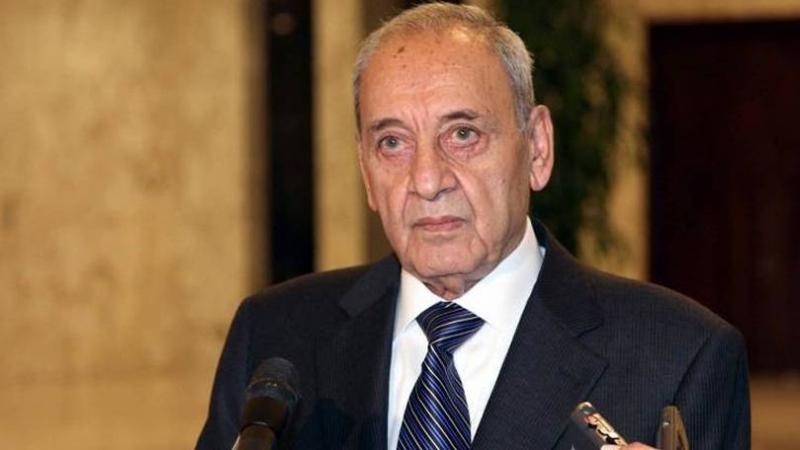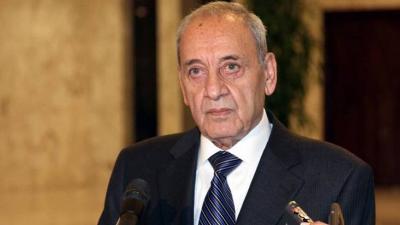The sessions for electing the president of the republic, held weekly, have turned into a political play that fills the void while awaiting an internal settlement that has yet to mature, or external interventions that may impose a president who does not meet the specifications set by this party or that. It seems that the political forces have accepted the inevitability of the ongoing presidential vacancy, as evidenced by the position of Lebanese Parliament Speaker Nabih Berri, who announced that he will allow a period of weeks, possibly until the end of the current year, for agreeing on a president, or else he will take another action.
Berri's remarks carried multiple interpretations; at the very least, he indicated that he and his bloc would not continue voting with "white papers" but would nominate their presidential candidate. Sources close to Ain al-Tineh (the location of the second presidency) stated that the Speaker "will not accept the continuation of the collapse and the deepening pit into which Lebanon and the Lebanese people find themselves.” They noted that some have "crossed the limits of national responsibility by refusing to respond to calls for dialogue and resorting to maneuvers that do not lead to electing a president." The sources clarified to "Asharq Al-Awsat" that "the presidential election crisis reflects a severe national division, due to disagreement over options."
They emphasized that the Speaker "will not accept the persistence of the vacancy for months or years as occurred prior to the election of President Aoun or President Michel Sleiman, and he is betting on internal contacts that he will activate in the coming days, while not ruling out a positive external role that could expedite the election of a president for the country."
The sources close to Ain al-Tineh continued: "We cannot waste the achievement of the maritime border demarcation, the exploration and drilling for gas, or the agreement with the International Monetary Fund, all of which require the election of a president to regulate the work of institutions."
The presidential election sessions held on Thursday solidified the division among parliamentary blocs. The opposition parties represented by the "Lebanese Forces," "Kataeb," and "Progressive Socialist Party" continued to vote for MP Michel Moawad, who received 44 votes in the last session, while the blocs aligned with "March 8 Forces" persisted in voting with "white papers." This indicates that these blocs do not agree on a single candidate. The votes of the change and independent MPs were scattered, with some voting for "New Lebanon," which was deemed invalid, while six voted for university professor and academic Issam Khalifa.
In light of the ongoing stagnation that Berri seeks to break without revealing his plan, Ali Khreis, a member of the "Liberation and Development" bloc, expressed his regret that "the presidential election sessions have turned into a play, allowing each party to entrench itself behind its position." He stated in a comment to "Asharq Al-Awsat" that "it is essential to break the monotony of the current scene through dialogue and discussion among the parliamentary blocs to reach a solution that ends the crisis." Khreis confirmed that Speaker Berri "will not remain idle and will initiate a movement of consultations soon to return to dialogue and open channels for solutions."
He reminded that "the nature of Lebanon can only be established on internal dialogue that lays the groundwork for a common understanding supported regionally and internationally, blessing this agreement and opening a new chapter in relations between Lebanon and its Arab environment as well as its international partners." He added: "The formula that the Speaker will work on will lead to the election of a president who unites rather than divides."
While awaiting Berri's alternative options and whether another call for dialogue will be issued, which has already been rejected by the two major Christian blocs, "Lebanese Forces" and "the Free Patriotic Movement," some parties expressed a desire to extend communication channels between the main forces. A prominent source in the "Progressive Socialist Party" confirmed to "Asharq Al-Awsat" that the party leadership "supports Berri's position and warnings against political separation regarding the presidential elections." He indicated that "the country cannot bear a vacancy for a long time, and efforts should focus on finding a flexible formula for electing a president that fulfills the national interest," considering it "natural for each team to have its candidate and engage in its battle." Finally, he emphasized that "reason and logic dictate that solutions must be sought when the horizon is blocked."




